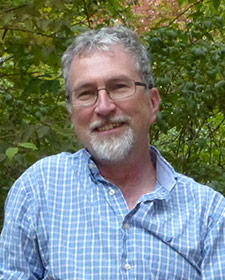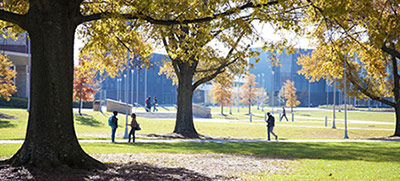NC TraCS Service Helps CTSA Partner Develop Grant Proposals for Biomedical Research
Shrinking budgets have caused scientists to scramble harder than ever to secure funding for their research. The National Institutes of Health (NIH), the main source of funding for biomedical research in the United States, has lost 22 percent of its purchasing power since 2003. As a result, it has gone from funding one in three research proposals to funding only one in six.

Despite the challenging funding climate, UNC’s research enterprise has doubled in the last decade, reaching nearly $800 million in 2014. Now, UNC is sharing the secrets of its success with other institutions to help bring more research dollars to North Carolina. It is part of a larger effort to overcome barriers to clinical and translational research by improving efficiency, training the research workforce and disseminating successful research methods.
Over the last year, David Carroll, PhD, Director of Research Funding Development at the North Carolina Translational and Clinical Sciences (NC TraCS) Institute, has helped a dozen researchers at the North Carolina Agricultural & Technical State University (N.C. A&T) develop stronger and more effective grant proposals. N.C. A&T is a developing partner with NC TraCS, one of 62 medical research institutions funded by the Clinical and Translation Sciences Awards program.
“UNC has tremendous expertise in biomedical research, and N.C. A&T has strengths we don’t have, like research in materials science, environmental science, food and agricultural science, nanoscience and nanoengineering,” says Carroll. “Our goal is to bring N.C. A&T in to the biomedical fold, so we can have a more symbiotic relationship where researchers at the two institutions can easily see the benefit of working together.”

Twice a month, Carroll travels to Greensboro to hold office hours from 9:30 am to 4:15 pm in the atrium of the Edward B. Fort Interdisciplinary Research Center on the N.C. A&T campus. Researchers can reserve a 45 minute block of time with Carroll beforehand and get advice on practically any topic related to research funding, from identifying appropriate grant opportunities to straightforward editorial assistance.
“A wealth of resources are available to North Carolina A&T State University as a result of our partnership with UNC and RTI, through the NC TraCS partnership,” says Meriel Parker, MS, Director of Life Science Research at N.C. A&T and CTSA Liaison to NC TraCS. “The grant writing expertise Dr. Carroll offers is a valuable benefit to our life science research development process; in fact, I incorporate his services into my proposal development strategy, early, when facilitating opportunities to cultivate faculty research projects.”
The ultimate goal is to create more educated consumers of an ever-shrinking funding budget. “Rather than write the grant application and fling it in to the abyss of the NIH, researchers need to know more about how the system works so they can be a bit more strategic about how they develop their proposals,” says Carroll. “Unfortunately, being shot down is business as usual, and getting funded is the brass ring that doesn’t come up very often. But if you don’t learn from the reviews and keep putting applications in, you’ll never get funded. You have to keep banging away.”
Carroll helps researchers with applications for NC TraCS $2K-$50K pilot awards as well as larger federal grants coming from the NIH, National Science Foundation (NSF), and Department of Defense (DOD). One of his biggest repeat customers has been Yeoheung Yun, PhD, an associate professor of chemical, biological, and bioengineering. Among other things, Yun has developed an artificial system that simulates the interior of blood vessels. Researchers can use this model to test different versions of biodegradable metal stents for temporarily unblocking arteries that supply blood to the heart.
Yun and Carroll worked together for a year, sending dozens of revisions on a single NIH proposal back and forth between the two universities. Their efforts eventually resulted in a SCORE Research Continuance Award (SC3), a grant specially designed to increase the number of individuals at minority-serving institutions who are engaged in biomedical research.
“He has always provided good insight on how I should write winning proposals,” said Yun. “I always contact him first, even before starting to write a proposal. Not only does he help with editing, but he guides me on how to organize the entire proposal and position it for success. I was able to get one NIH grant (SC3) and two NC TraCS pilot grants with his great help.”
— Director of Research Funding Development, David Carroll
Thus far, Carroll has lent his expertise to a dozen different researchers at N.C. A&T. Salil Desai, PhD, an associate professor of industrial and systems engineering, has won a TraCS 4D award to develop a way to use 3D printing to create devices for radiation therapy out of recyclable plastic. These devices can steer beams of ionizing radiation precisely on the cancerous tumors, protecting the surrounding healthy tissue from collateral damage.
Another researcher, Mohd Anwar, PhD, an assistant professor of computer science, has submitted an NIH R15 research proposal for a smartphone app for personalized health and wellness management. The app keeps track of specific circumstances that trigger a person to engage in unhealthy behaviors, and then alerts them when they are entering a situation that might cause them to fall off their diet.
“We work collaboratively to promote the research endeavors of N.C. A&T faculty,” says Parker. “This shared commitment to the development of the life science research communities of our respective universities is truly what makes this partnership so advantageous. The value of collaborative efforts always outweigh the efforts of a single entity.”
Researchers at N.C. A&T face a number of challenges. They have a huge teaching load, and that can get in the way of their ability to write, as well as their ability to do the work if they ultimately get funded. Plus many of them have very little experience with the NIH. ”I try to put them in the mindset to succeed,” Carroll says. “At the end of the day, a scientist might do good work, but they might not have a lot of time or great writing skills. It is a better use of their time to keep generating data. It is a better use of everybody’s time for me to help them translate their science into finished grant applications.”
- Created on .